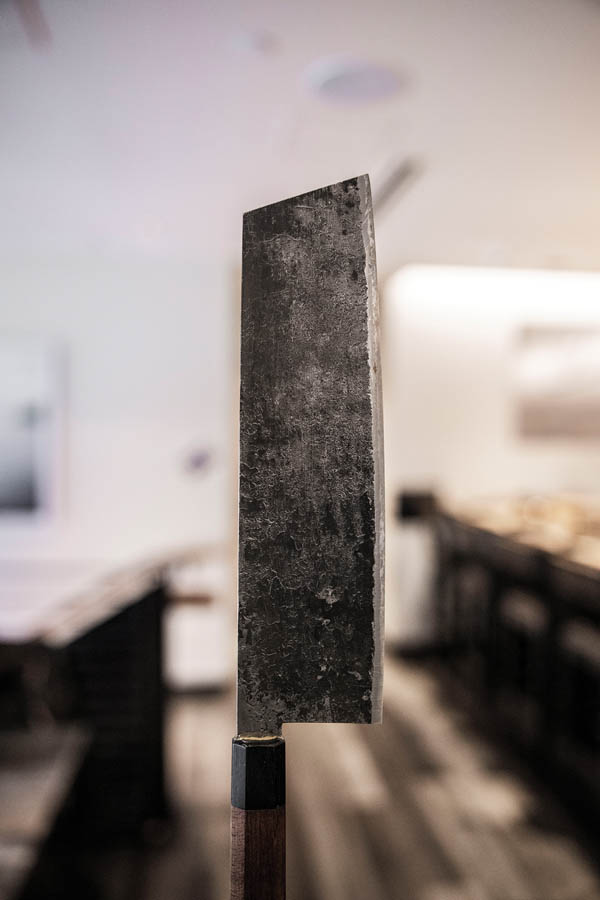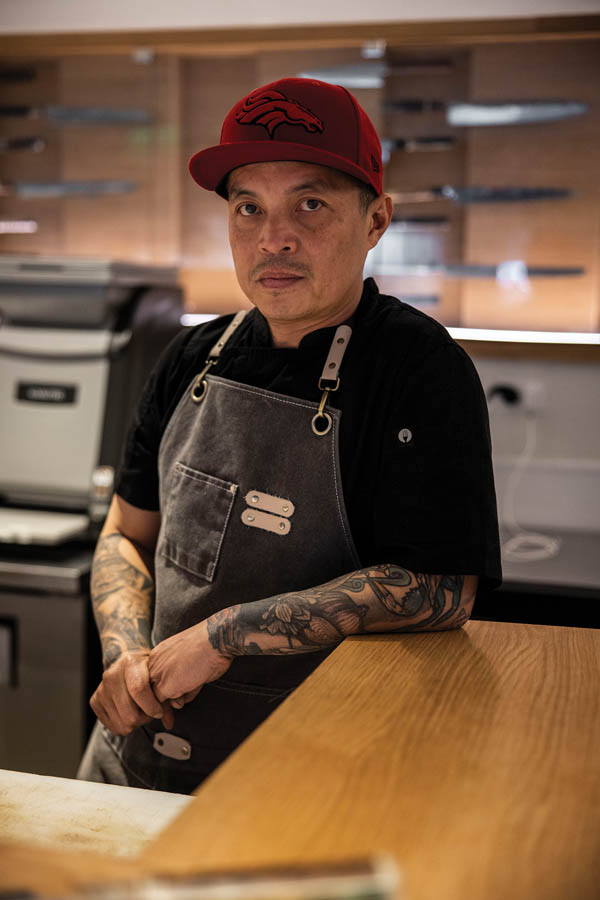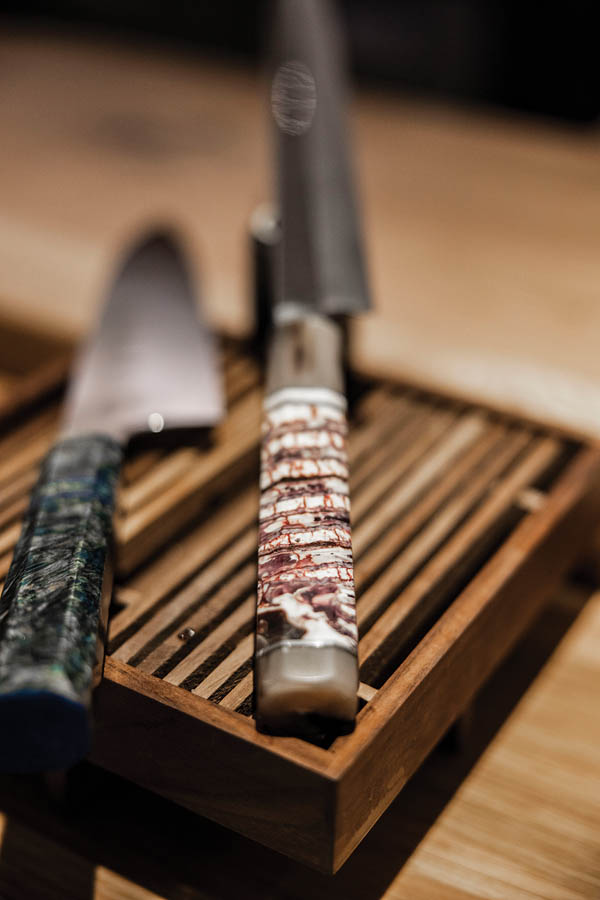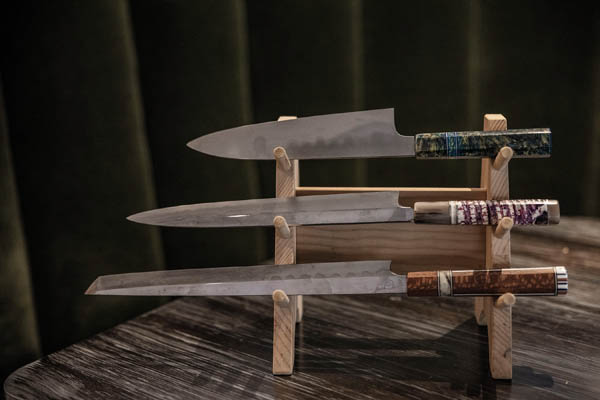Duy Pham is an artist whose identity changes depending on the universe in which you encounter him.
As one of Denver’s best-known chefs, he captivates diners’ taste buds at Foraged restaurant. His kitchen environment is pristine and uber-organized.
The small cottage behind his Denver home, however, isn’t quite as tidy. He apologizes for the sawdust generated by a pile of wood chunks and his drill press, belt sander, grinder and table saw. It’s in this studio that Pham grinds out the one-of-a-kind knife handles that chefs, collectors and fans across the globe revere.
How in demand are his creations? If you want to taste the chef’s French-meets-Japan fare, you need to make a reservation at least a week in advance. But if you want Pham to fashion you a knife handle that fits perfectly in your hand, you will probably not be served for a few months.
“I’m a little backed up. I’ve got 14 handles to work on,” Pham says. For his clients in the U.S., Malaysia, the Philippines, Japan, Australia and Vietnam, it’s well worth the wait.
“I made a knife handle for one of the Broncos that changes from blue to orange as you move it,” he says. “I have some that I made from glow-in-the-dark material.”




Pham has used woolly mammoth teeth, elk and antelope antlers, whale and camel bones, as well as pieces of meteorites and high-tech carbon fiber material … sometimes in the same knife handle.
To him, fitting a knife handle is personal. “Everything’s about improving performance,” he explains. “The idea is to fit the tool to the chef’s hand, not the chef to the knife.”
In his workshop, Pham avoids clunky European handles, specializing instead in the octagon-shaped Japanese wa handle. “Some clients want a shorter, thinner or wider handle, depending on the size of their hands,” Pham says.
As in many industries, there is a universe of highly specialized kitchen tools. “The Japanese have a knife just to cut eel and one only for making vegetable garnishes,” he says.
Pham’s rise in knife prominence started only six years ago and quite unintentionally.
“I had heavy calluses and other problems from using German knives,” the 47-year-old chef remembers. “When I finally used a Japanese knife, it changed my life. They are lighter, sharper and easier on the wrists and shoulders.”
Pham eventually needed to fix the handles on his favorite knives. “I took six knives to a shop in Denver, and they wanted $150 per handle. I thought: “That’s ridiculous. I’ll make them myself.” I had always been into woodworking. So, I went to the hardware store, and I’ve ended up spending thousands of dollars on equipment instead,” he says with a shrug and a smile.
His early knives were forgettable, he says. “I’m a perfectionist. I’d make handles, decide they were too bulky or awkward or weighted wrong, and I just destroyed them and started over,” Pham explains.
He took it to the next level by introducing himself to Oregon-based Murray Carter, the great Japanese-trained master bladesmith. “He’s like the Thomas Keller of knives,” Pham says, referring to one of the top chefs in the United States.
To understand the Zen of handle-making, Pham also knocked on the door of Matt Deloso. “He’s considered the best knife handle maker in the world,” Pham says. “He introduced me to all these exotic materials.”
One of Pham’s most prized possessions is a Deloso handle incorporating 18 materials ranging from sycamore to mirror-polished steel. “That handle cost me $500 and it was worth it. I keep it on display. It’s the standard I want to reach,” he says.
In the beginning, the chef made handles for himself and his cooks. “I posted the ones I liked on social media, and I got more and more followers,” he shares. “People started asking me to make handles for their knives,” the chef adds proudly.
The process introduced Pham to the unique global metaverse of high-end knife collectors. “They send rare Japanese blades, and I make custom handles. For some, price is no object, just quality. These knives are usually for display only,” he says.
Mostly, Pham is a re-handler. “Chefs ship me their favorite blades. They pick the materials but give me complete artistic freedom. I find that strange because I wouldn’t want to do that,” he says.
Pham grew up in Aurora and was working in kitchens as a teenager. By 22, as one of Denver’s youngest executive chefs, he delighted diners with his deft reimagining of classic French dishes at the legendary Tante Louse. In recent years, Pham opened Parker Garage with two partners who then launched Foraged in LoDo’s Dairy Block. The name, branded as For[a]ged, suggests both foraging for rare ingredients and forging sharp blades.
On Friday and Saturday nights you can typically find Pham using his knifes at Foraged serving omakase—chef’s choice of 20 bite-sized courses—in an upstairs raw bar. Behind him is a wall lined with glass cases displaying some of his more than 200 knives, most of which are for sale. It’s the only place you can see the knives and handles outside his Instagram feed.
While Pham owns a forge, anvil and sledge-hammer, he leaves the Forged in Fire blade-making to others for now. “I feel like I’m one of the elites when it comes to handles, but I’m a beginner at knife forging. There’s so much to learn,” he says.
Besides, Pham has bigger fish to fillet. “Next, I want to make my own plates for the restaurant,” he says.
The successful restaurateur admits that playing with knives is an obsession, not a career move. “When I’m finally done, I probably make $10 an hour making handles,” he predicts. “It’s okay. It’s what I love.”
For[a]ged, Denver
720.826.2147; foragedrestaurant.com


